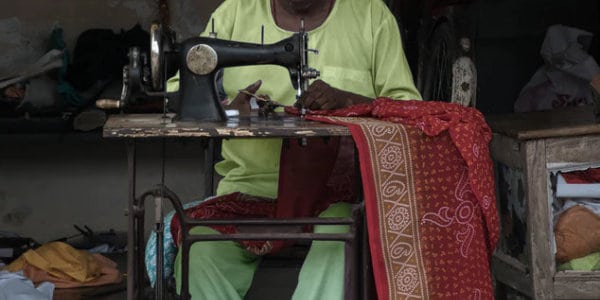Taking refuge, sunlight slipped into the corner storefront. Fabrics brightened into a butterfly garden’s worth of colors on the long tables. Kente cloth showed the monarch’s colors and the denim a morning cloak’s spots. Violet stood in the midst of her fashion kingdom, wondering what form the next prickle would take.
Violet’s two friends, teachers off for the summer, were arranging pieces for the day’s project—polyester flag-dresses for the Fourth of July. Bess and Nikki were both there to nurture the spark in Violet’s eyes that showed in her art. (Bess and Nikki had both lost foster daughters to the street, so there was that too.) Behind them on the shop’s walls, steppin’-out models, in collages from Vibe and Source, strutted with their spiked leather boots, splashy low-cut blouses, and shiny brown faces, sepia to mahogany.
Atop an old tavern counter, Roberto, the middle son, laid out his special rocks. Under one set of shelves, Violet’s youngest son Danny marshaled toy soldiers. His smile was as sweet as his mother’s. “Are you my grandmothers?” he said to the older women. They laughed.
Bess, a Baptist, wore her colorful African robes and longed to sew some magic of her own. Nikki had learned crocheting skills from her grandmother, but craved more color in her life than lace doilies. And, abracadabra, here it was: Without a pattern, Violet created Caribbean shirts from scraps of floral yellow and piriqueta purple; out of stripes and sea-shell patterns, handbags would appear; from the browns and whites of mud-cloth, tropical flowers bloomed.
“You have beautiful children,” said Bess to Violet.
“I love the way your youngest tries to help you sew when he’s not playing with his toys,” Nikki said and winked over at Danny who smiled back. (Praise children and they will blossom.)
“But,” Bess added softly, “You need to get your boys registered for school.”
“You need to get your boys out of the back room here and into a place with plumbing and beds,” said Nikki.
“I have to finish this order first, and get paid the rest,” Violet answered. “Antes que nada.” First things first.
“People just have to see your stuff,” said Nikki. Nikki solved things, step by step, like piecing the triangles in her flying geese quilts. She thought artistry just might save Violet.
“Let’s work on what we can get done today,” said Bess. “The women at church can help you with the rest.”
The sewing shop hinted a rose aura behind its Romanesque windows—like some seasonal return of its days as the Cardinal Tavern, or perhaps it was just a strange rhythm in the white florescent lights. Its hue cast to the fringes the spent drinking-glass shelves, the forlorn panel-walls, and the fate-sealed stains in the old bar countertop. Pambiche maranga and free-motion salsa would often alternate their rhythms throughout the day on the shop’s boom box, and Violet laid out her problem.





